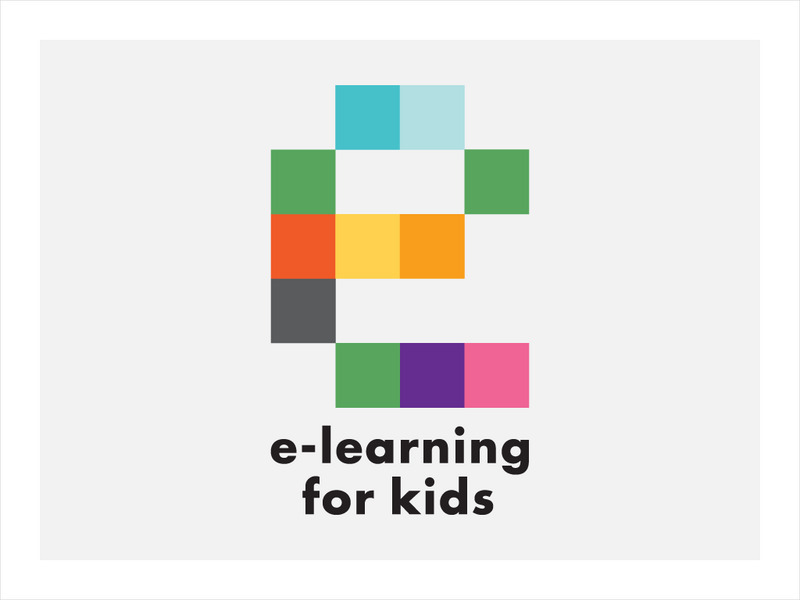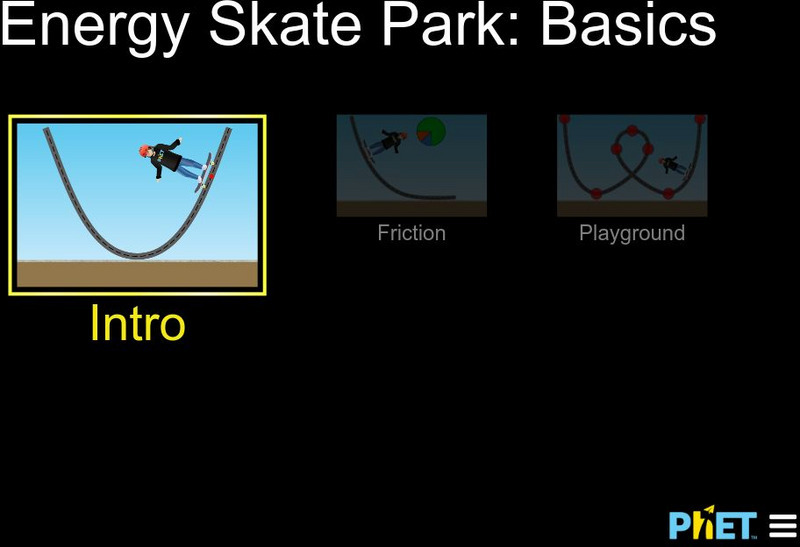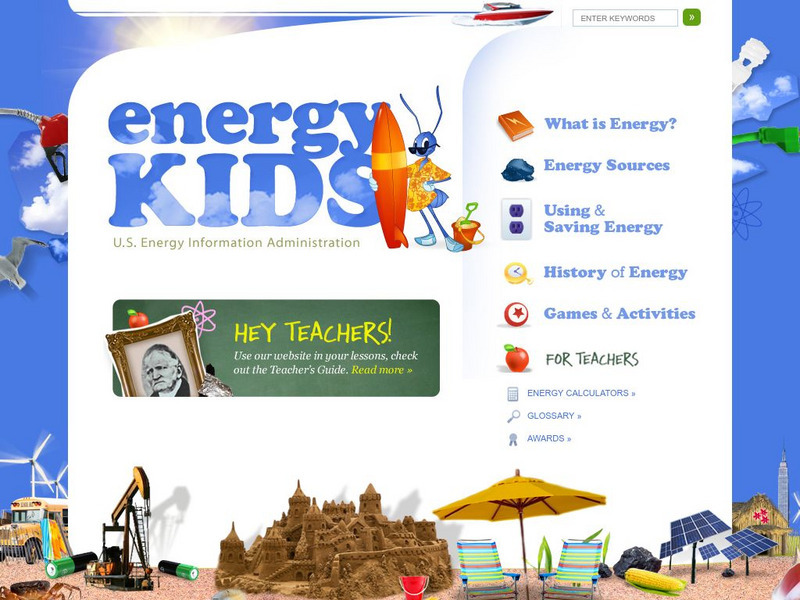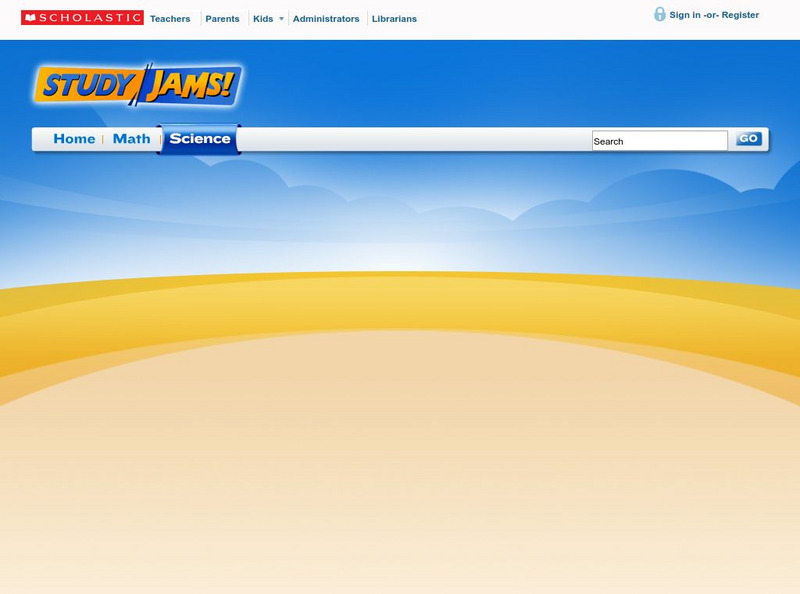CK-12 Foundation
Ck 12: Physical Science: Forms of Energy
[Free Registration/Login may be required to access all resource tools.] Introduction to the seven different forms of energy.
E-learning for Kids
E Learning for Kids: Science: Antilles: What Are the Different Forms of Energy?
Students will learn about the different types and sources of energy, including heat and light, electrical, potential, and kinetic energy.
CK-12 Foundation
Ck 12: Physical Science: Forms of Energy
[Free Registration/Login may be required to access all resource tools.] Introduction to forms of energy including the seven different forms.
University of Colorado
University of Colorado: Ph Et Interactive Simulations: Energy Skate Park
Explore kinetic, potential, and thermal energy as you send a skateboarder along several pre-built tracks, then design your own. Charts and graphs show the distribution of the different forms of energy, illustrating how the total energy...
CK-12 Foundation
Ck 12: Physical Science: Energy
[Free Registration/Login may be required to access all resource tools.] Discusses the definition of energy, the SI unit, and the seven different forms of energy.
US Energy Information Administration
U.s. Eia Energy Kids
This comprehensive lesson teaches all about energy, including the different forms, the periodic table, history of human energy use and production, and energy units. It contains an interactive energy calculator, games and activities, and...
SMART Technologies
Smart: Forms of Energy
Expose students to this introduction to several different forms of energy.
Science Education Resource Center at Carleton College
Serc: Investigating Light: A Form of Energy You Can See
Students will investigate how light is a form of energy that travels as waves away from the source. The basis for this lesson is taken from the Houghton Mifflin science curriculum. In the lesson experiments, students will predict if...
Scholastic
Scholastic: Study Jams! Science: Matter: Energy & Matter
A video and a short quiz on the different forms of energy, and how energy moves or changes matter.
E-learning for Kids
E Learning for Kids: Science: Pirates: What Is Energy Conversion?
This lesson covers the different types of energy, the definitions of kinetic and potential energy, how energy can be converted into different forms, and the law of conservation of energy.
E-learning for Kids
E Learning for Kids: Science: Cayman Islands: What Is Energy Conservation?
Renewable and nonrenewable energy sources are described, different types of energy, and how energy can be conserved.
TeachEngineering
Teach Engineering: Energy of Motion
By taking a look at the energy of motion all around us, students learn about the types of energy and their characteristics. They first learn about the two simplest forms of mechanical energy: kinetic and potential energy, as illustrated...
Other
National Renewable Energy Laboratory: Learning About Renewable Energy
Extensive information about the different forms of renewable energy, energy efficiencies that can be achieved, energy research, and the many applications for renewable energy production.
BBC
Bbc: Gcse Bitesize: Energy Demands
Electricity is a very convenient form of energy that can be generated using different energy resources. Some of these resources are renewable and some are non-renewable. Each resource has advantages and disadvantages. A link to a test is...
TeachEngineering
Teach Engineering: Renewable Energy Living Lab: The Bright Idea
Students use real-world data to evaluate the feasibility of solar energy and other renewable energy sources in different U.S. locations. Working in small groups, students act as engineers evaluating the suitability of installing solar...
Other
Characteristics of Energy and Matter
A lengthy page from the Fundamentals of Physical Geography site. Energy is distinguished from matter, and the different forms of energy are identified and discussed. Four types of heat transfer (convection, advection, conduction,...
TeachEngineering
Teach Engineering: How a Hybrid Works
In Lesson 4, young scholars conclude the Research and Revise step of the Legacy Cycle, as they investigate different forms of hybrid engines as well as briefly conclude a look at the different forms of potential energy. Students apply...
Ducksters
Ducksters: Physics for Kids: Energy
Kids learn about the science behind Energy including its different forms such as chemical, electrical, heat, and gravitational. When is energy considered renewable or nonrenewable?
Other
Chewonki Foundation: Pathways to a Sustainable Future: Renewable Energy
Information on different forms of renewable energy with links for student projects, resources for teachers, and links to related resources.
Khan Academy
Khan Academy: Thermodynamics Article
Thermodynamics is a very important branch of both physics and chemistry. It deals with the study of energy, the conversion of energy between different forms and the ability of energy to do work. Through this article, you will begin to...
University of Sydney (Australia)
Thermal Physics Module/heat Transfer 1 [Pdf]
The first of two pages discussing the different forms of thermal energy transfer. Equations expressing the rate of energy transfer by each of the methods are provided and discussed.
ClassFlow
Class Flow: Bicycle
[Free Registration/Login Required] In this flipchart the science of cycling is discussed. What makes the bicycle the most effective form of transportation today, what muscles are used while cycling, and different uses of energy are all...
PBS
Pbs Learning Media: Sources of Radiation
An interactive activity that discusses how radiation is like energy and comes in different forms.
Concord Consortium
Concord Consortium: How Can a Small Spark Start a Huge Explosion?
Students explore connections between electric forces and molecules using simulations, and explain energy transfers using conservation of energy. This concept will be explored in the following activities. Activity 1 What makes materials...



















